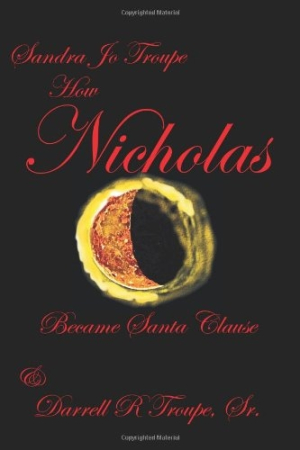How Nicholas Became Santa Clause
How Nicholas Became Santa Clause has precious little to do with Santa and the holiday with which he is normally associated. This is not a Christmas story, and the Clause (with an “e” at the end of “Claus”) of the title, magical toymaker that he turns out to be, is nothing like the big-bellied man in the red velvet suit.
Sandra Jo Troupe and Darrell R. Troupe have instead concocted a rather traditional fantasy adventure in which the person who is to someday become Santa is an orphan raised by Thomas Clause, a carpenter and master toymaker, in a pseudo-eighteenth-century northern European kingdom where fairies, talking polar bears, wizards, and dragons abound. Nicholas is especially attuned to “the linkage, the magic created by the energy connecting all things living.” Like another young lad in a galaxy far, far away, he will eventually draw upon that force to battle the bad guy and save the princess.
How Nicholas Became Santa Clause may disappoint readers seeking a Kris Kringle story, but it is a nice G-rated young adult adventure, one suited even for bedtime reading to or by older children. The Orphic Forest, wherein much of the tale is set, is indeed a mystic wood, and there live trolls, gnomes, ogres, shape-shifters, giants, and other creatures familiar to fans of the genre. There are also some less-expected cameo appearances by Jack Frost and Father Time, to name just a couple. The authors add in a few unique creatures, notably the blackhearts, “wrinkled little men” who can move about rapidly by turning themselves into “inverted tornadoes.”
The evil that drives the plot emanates from one “overly intense” and surly prince named Zili, who seeks to steal his older brother’s throne. He and his plot take over the novel to the point that the authors seemingly forget Nicholas and make no mention of him for about 150-plus pages.
The Troupes write to a younger audience quite charmingly, although with numerous if minor typographical errors. “Coup” for “coop,” “patient’s” for “patience,” “Princess Anglican” for “Princess Angelica,” and varying combinations of upper and lower case for “Royal Equestrian Guard” are but some of the book’s trifling yet frequent mistakes.
The story is a traditional and linear one, and it makes for a light and entertaining diversion. It is easy for children, teens, and adults to follow, and there are enough surprises and twists to keep readers (or those being read to) interested. Here and there, the Troupes do sprinkle in a bit of the traditional Santa legend, such as when Nicholas remarks that “all good children are special” and “all children are good,” or when the king tells Tom Clause, “your boy has brass. One day, everyone, everywhere shall know his name.”
Before becoming a well-known figure, however, Nicholas must first battle like a Jedi and “use the linkage,” as the voice only he can hear tells him, so that he can become the “people’s champion” and thus earn from his king the sobriquet “Santa Clause—guardian of those in need.”
Reviewed by
Mark McLaughlin
Disclosure: This article is not an endorsement, but a review. The publisher of this book provided free copies of the book and paid a small fee to have their book reviewed by a professional reviewer. Foreword Reviews and Clarion Reviews make no guarantee that the publisher will receive a positive review. Foreword Magazine, Inc. is disclosing this in accordance with the Federal Trade Commission’s 16 CFR, Part 255.

